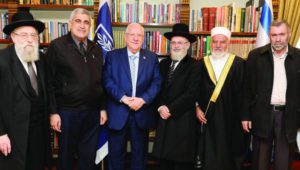
President Rivlin convened a meeting with religious leaders on the ‘muezzin bill’, Nov. 29. (Mark Nayman/GPO)
Member of Knesset Yehuda Glick, otherwise known for his visits to the Temple Mount to prayer there, called a bill proposal to limit loudspeakers “unnecessary” and said noise issues between neighboring communities in Israel should be solved by dialogue not legislation.
Speaking at a Knesset conference co-hosted with MK Zouheir Bahaloul (Zionist Camp), Glick said that at first glance the bill seems like a fair attempt to address a simple social issue, but upon closer inspection the bill provides a view into some of the deepest issues facing Israeli society.
“Muslims feel the bill is yet another Israeli attack on their community and an act of ‘war’ against Islam. Many Jews feel that Muslim opposition to the measure stems only from a desire on the part of many Muslims to show Israeli Jews that they are strong.
“When I speak to my Muslim friends, it is clear that there is good will on all sides to both preserve religious freedoms and to be considerate of all people in the pre-dawn hours. We can deal with the muezzin issue without hurting or offending anyone,” Glick said.
The bill, proposed by MK Moti Yogev (Jewish Home), calls to ban loudspeakers for early-morning calls to prayer.
It was approved by the Ministerial Committee for Legislation on Monday, Nov. 28, but has been met with severe criticism from Arab MKs, Palestinians and human rights organizations who say the bill is “racist.”
Orthodox politicians also opposed the bill because they were afraid it could be applied to sirens announcing the Sabbath, but they have since rescinded their opposition.
A resident of Lod, a mixed Jewish-Arab city, noted that no Muslim religious leaders from her city attended the session.
“We have tried and tried and tried to speak to Muslim leaders in Lod, but there is simply nobody to speak with,’ she said.
“The sheikhs in Lod simply won’t listen, they aren’t willing to talk about it, they aren’t willing to come to any agreement. I am absolutely opposed to the current bill, but I also note that it is no surprise that the push for the law originated in Lod.
“We have come up against a solid wall [of intransigence],” added another resident of the city. “I’m opposed to this law, but the function of legislation is to address situations and individuals who aren’t prepared to compromise or even to recognize that there is a problem.
Last week, Israeli President Reuven Rivlin hosted a group of Jewish and Muslims leaders to discuss the bill, calling for dialogue.
“Jerusalem has always brought together the various voices, Jewish prayers with the muezzin’s call to prayer along with church bells,” Rivlin said.
“I am the son of a person who translated the Koran and observed the Jewish commandments, and I recognize the need to tread a fine line. It would be a shame for a law to be born which touches on the issue of freedom of faith of a specific group among us.”
















